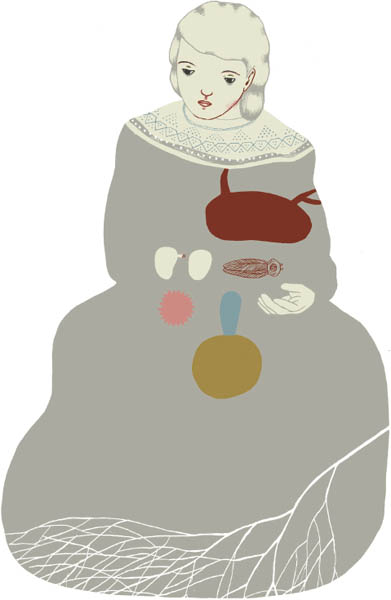Camilla Engman is a multitalented artist from Sweden. She studied painting for two years at Dômen Art School, and then graphic design at the College of Arts and Crafts in Göteborg. She has since spent many years experimenting with techniques and materials in her lovely studio, also in Göteborg. She paints, draws, collages, makes objects, assembles and photographs amazing collections of things, all of which have been exhibited worldwide. Outside of her fine artwork, she has been commissioned to create illustrations for a huge list of magazines and a number of beautiful, beautiful books. And speaking of beautiful books, The Suitcase Series Volume 1, published by Uppercase, is an excellent sneak peek into Camilla’s lovely, creative, inspirational world.
JC—You make a lot of things. Which materials do you love most?
CE—I love paper! Paper and pen, nothing beats that. When I paint, I use acrylic colors. I like how it looks, but I would never say that I love it. I might say that I love my computer and that maybe I couldn’t live without it—but just maybe.
JC—Which artist’s work/life/career would you like to have?
CE—Hmm . . . Why not Pablo Picasso, for his long career and to have been around when so much was happening in the art scene? To sit at a café in Paris, talking to Jean Cocteau about Igor Stravinsky. To have Gertrude Stein introduce me to Henri Matisse. To be in the middle of such an exciting period, and to live such a long life.
JC—Describe the first time that you truly felt like “an artist.”
CE—I still have my doubts.
JC—What brings on a creative block for you? How do you get through it?
CE—For me, a creative block usually means that I am tired, that I’ve worked too much for a period and just need to take it slow for a day or two. Sometimes it’s that I lack confidence, so I’ll have to make myself so inspired that I don’t notice the scariness. I start in a new direction, change the material, or work with old stuff until I relax again.
JC—Where do you find the inspiration that helps you ignore the scary part?
CE—My number-one source is film. Looking to a film filled with pictures, colors, and feelings—nothing beats that. Number two is music (I’ll get that too watching a film, if I’m lucky), but that takes more effort to absorb. And then, of course, the Internet, books, and magazines.
JC—Do you ever get overwhelmed by the amount of amazing artwork that you can find online, in books, and in magazines?
CE—I usually don’t get overwhelmed, but I often feel like I want to be part of everything. And that I want to do so much more, try more materials, work in other directions, and so on—because of all the great work out there.
JC—You are an illustrator by day—does this drain you creatively, or does it fuel you?
CE—It depends on the assignment, and where I am in the process. Getting started is the most time- and energy–consuming part. I think the illustrator steals from the artist (time and ideas), and since illustration assignments often involve other people, it will always come first, and the art part last. Painting needs so much time and “air” around it—it’s almost impossible to do something else at the same time. It can also feel like my hand and brain are set in illustration mode, and if I am supposed to do art I’ll just have to wait. So I guess the simple answer would be yes, it somewhat drains me, but I wouldn’t like to have it any other way.
JC—Could you give one little trick to use when a painting isn’t working?
CE—Sometimes it’s hard to see what’s wrong, what needs to change. That’s when turning the painting upside down, or looking at it in a mirror, is a good trick.
JC—How do you deal with criticism—positive and/or negative?
CE—Positive criticism I don’t trust, and the negative sticks . . . that says it all, I’m afraid. I wish it were different, but it’s not. I’m not good at getting criticism, so I try to avoid it.
JC—Does your inner critic ever get to you?
CE—Yes, of course, it gets to me sometimes. You’ll get a creative block if you listen to your inner critic too much. It can feel like you’re not good at whatever it is you’re doing. If that happens to me, I’ll have to start over, ignore, work. I don’t think it’s all bad. This is also what makes me work harder, and not leave things half done.
JC—Describe how you feel when things are truly flowing.
CE—It feels like being an alchemist and that everything is possible. Maybe I could even make gold!

Sometimes it’s hard to see what’s wrong, what needs to change. That’s when turning the painting upside down, or looking at it in a mirror, is a good trick.